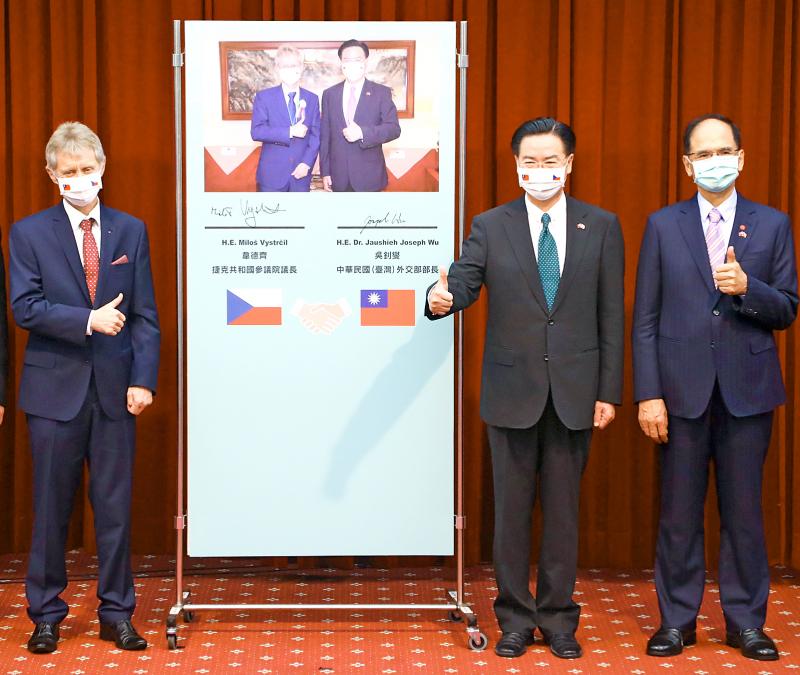Twenty-three tangible accomplishments have been achieved during the Czech delegation’s visit to Taiwan, with bilateral ties in various sectors upgraded to comprehensive partnerships, Minister of Foreign Affairs Joseph Wu (吳釗燮) said yesterday.
Wu yesterday received Czech Senate President Milos Vystrcil and about half of the delegation at the Ministry of Foreign Affairs in Taipei, as the group planned for tonight’s departure after a six-day visit.
There have been concrete developments in trade and investment, scientific research and education, and public healthcare and epidemic prevention between the two nations, Vystrcil said, adding that the Czech government would form task forces to track how the projects progress.

Photo: CNA
Their trip nails down the sovereignty of the Czech Republic while improving cooperation between democratic nations, he said.
Wu said that the delegation’s trip is historically significant for its creation of a cooperation mechanism in which Taiwan and the Czech Republic are like-minded partners.
Enumerating key bilateral achievements, Wu said that on Monday, three memorandums of understanding were signed between Taiwanese and Czech business entities.
Invited to Taiwan by Legislative Speaker You Si-kun (游錫堃), Vystrcil said that You should visit the Czech Republic someday.
The government would continue to sustain ties between sister cities Prague and Taipei, as well as promote exchanges between the Vysocina Region, located near Prague, and local municipalities, Wu said.
Representatives of the University of Chemistry and Technology Prague signed memorandums with National Taipei University of Technology, National Tsing Hua University and Tunghai University, he added.
China Airlines is considering opening direct passenger flights between Taipei and Prague after the COVID-19 situation abates, he said.
On Sunday last week, a chartered flight operated by the airline flew the delegation to Taiwan Taoyuan International Airport.
“A direct flight between Prague and Taipei is on the right track. Representatives of China Airlines (Taiwan’s air carrier) support it,” Prague Mayor Zdenek Hrib wrote on Twitter on Monday.
Taiwan Cooperative Bank and Export-Import Bank are evaluating setting up new offshore branches in the Czech Republic, the ministry said later in a news release.
To promote freedom of the press, the ministry is willing to help Czech media outlets set up offices in Taiwan, it said.
The government would ask local universities to offer 50 scholarships to Czech students to come to Taiwan to learn Chinese, the ministry said.
It would promote personnel exchanges between high schools, and exchanges of academics from the Czech Academy of Sciences with Academia Sinica and the National Applied Research Laboratories, it said.
The Prague Philharmonia, whose tour in China last year was canceled by Beijing, would tour Taiwan next year, it said.
Taiwan and the Czech Republic would also exchange exhibitions of works of art, including those curated by the National Palace Museum, the ministry said.
Over the past few days, representatives of 36 Czech firms attended more than 260 meetings and collected more than 1,000 business cards, Czech-Taiwan Business Chamber chairman Pavel Divis said.
Although exhausted due to the tight schedule, the Czech businesspeople are excited about the tangible results that they are taking home, he added.
This afternoon, the delegation is to attend in a forum in Taipei on supply chain restructuring. It is being hosted by the American Institute in Taiwan and is to include European and Japanese representatives.

‘DENIAL DEFENSE’: The US would increase its military presence with uncrewed ships, and submarines, while boosting defense in the Indo-Pacific, a Pete Hegseth memo said The US is reorienting its military strategy to focus primarily on deterring a potential Chinese invasion of Taiwan, a memo signed by US Secretary of Defense Pete Hegseth showed. The memo also called on Taiwan to increase its defense spending. The document, known as the “Interim National Defense Strategic Guidance,” was distributed this month and detailed the national defense plans of US President Donald Trump’s administration, an article in the Washington Post said on Saturday. It outlines how the US can prepare for a potential war with China and defend itself from threats in the “near abroad,” including Greenland and the Panama

A wild live dugong was found in Taiwan for the first time in 88 years, after it was accidentally caught by a fisher’s net on Tuesday in Yilan County’s Fenniaolin (粉鳥林). This is the first sighting of the species in Taiwan since 1937, having already been considered “extinct” in the country and considered as “vulnerable” by the International Union for Conservation of Nature. A fisher surnamed Chen (陳) went to Fenniaolin to collect the fish in his netting, but instead caught a 3m long, 500kg dugong. The fisher released the animal back into the wild, not realizing it was an endangered species at

The Chinese Nationalist Party (KMT) is maintaining close ties with Beijing, the Democratic Progressive Party (DPP) said yesterday, hours after a new round of Chinese military drills in the Taiwan Strait began. Political parties in a democracy have a responsibility to be loyal to the nation and defend its sovereignty, DPP spokesman Justin Wu (吳崢) told a news conference in Taipei. His comments came hours after Beijing announced via Chinese state media that the Chinese People’s Liberation Army’s Eastern Theater Command was holding large-scale drills simulating a multi-pronged attack on Taiwan. Contrary to the KMT’s claims that it is staunchly anti-communist, KMT Deputy

The High Prosecutors’ Office yesterday withdrew an appeal against the acquittal of a former bank manager 22 years after his death, marking Taiwan’s first instance of prosecutors rendering posthumous justice to a wrongfully convicted defendant. Chu Ching-en (諸慶恩) — formerly a manager at the Taipei branch of BNP Paribas — was in 1999 accused by Weng Mao-chung (翁茂鍾), then-president of Chia Her Industrial Co, of forging a request for a fixed deposit of US$10 million by I-Hwa Industrial Co, a subsidiary of Chia Her, which was used as collateral. Chu was ruled not guilty in the first trial, but was found guilty